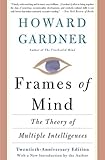Multiple Intelligences and Language Learning
 The term “Multiple Intelligences” was first coined by Harvard psychologist Howard Gardner. His theory is spelled out in the 1983 book, Frames of Mind: The Theory of Multiple Intelligences. Gardner posits that humans possess 7 types of intelligence, not just one:
The term “Multiple Intelligences” was first coined by Harvard psychologist Howard Gardner. His theory is spelled out in the 1983 book, Frames of Mind: The Theory of Multiple Intelligences. Gardner posits that humans possess 7 types of intelligence, not just one:
- linguistic intelligence
- logical/mathematical intelligence
- musical intelligence
- visual/spatial intelligence
- bodily/kinesthetic intelligence
- interpersonal intelligence
- intrapersonal intelligence
Sadly, traditional education systems focus only on the first two kinds of intelligence. This is just as true when it comes to foreign languages. Nearly all language courses, teachers and materials focus exclusively on linguistic intelligence (e.g. overt explanations of grammar, word usage, etc.). When people claim that they are not good at foreign languages, what they really mean is “I have low linguistic intelligence.” The good news is that it doesn’t matter!
Consider my case. When attempting to convince would be foreign language learners that they too can learn, the reply is usually the same: “You are just good at languages. I am not.” What they don’t realize is that my linguistic intelligence is actually quite low. I have been successful in foreign language learning because I tap into other intelligences.
So how then can we apply multiple intelligences in foreign language learning? First of all, you need to identify your strengths and weaknesses. You will then be able to make the most of the former and mitigate the latter. There are countless online surveys you can take to identify your multiple intelligence profile, but I recommend the one below one since it allows you to answer on a scale of 1 to 5 (more accurate than yes/no) and then offers suggested study methods to suite your strengths.
Take Action
- Click here to take the multiple intelligences survey.
- Read Gardner’s groundbreaking work .
Republishing This Article
Want to share this on your site or blog? You are welcome to republish any articles by John Fotheringham. For guest posts, you must seek permission from the post author. For John's articles, please include the following at the top and bottom of the article when reposting:
Copyright © 2010 by John Fotheringham. For more tips, tools, and tech for Mastering ANY Language, go to LanguageMastery.com


I’m a big fan of Gardner’s works and a big proponent of “spatial intelligence” which has helped me immensely in learning a lot of stuff including foreign languages.
I’m also very visual (it’s my strongest intelligence according to the survey I link to above). I often remember new things by associating them with a “location” in my mind (i.e. attaching one word to my front door, one to my bathroom, one to my fridge, etc.) This allows me to create a connection to items that otherwise have no anchor in memory.
The link “Take the Multiple Intelligences Survey” doesn’t work any more.
I just checked it; works fine on both my laptop and iPod Touch. Make sure that you enable pop-ups for this site.
This is a great quiz. I will use it to determine what works best with my students now.
NOTE: I have just installed a nifty comment plug-in from Intense Debate, but now none of the previous posts show up. The Intense Debate folks assure me that the comments have not been deleted and will show once they fix a glitch in the program. Stand by…
Looks like the comments are back! Yay! Hope you enjoy the new comment features..
Thanks for putting this article and test online.